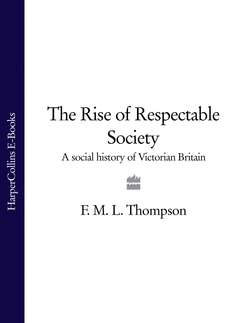Читать книгу The Rise of Respectable Society: A Social History of Victorian Britain - Литагент HarperCollins USD - Страница 6
Author’s Preface
ОглавлениеIt is fitting that an Editor who announces that the time is ripe to take stock of the effects of the explosion of interest in the social history of Britain should be the first to respond to his own call, if only to demonstrate that it is possible to offer a synthesis whatever the hazards of being tripped up on this or that point by the specialists. The expansion of social history, moreover, has not been a simple matter of the unearthing of new facts, new information, and new material by researchers digging in previously unknown or untapped sources, although there has been plenty of that. It has been above all a redefinition and enlargement of the territory of social history using instruments and concepts adapted from social anthropology and sociology, as well as quantitative methods, alongside the older guides derived from political economy whether of liberal or Marxist varieties. Where matters of faith, doctrine, or ideology are involved the synthesizer is necessarily stepping through a minefield. Nevertheless, the very fact that social history is about ideas and ways of viewing the behaviour and relationships of groups, genders, communities, generations, and classes, and not simply about the ‘facts’ of life – although sex is an important and often central activity which earlier generations of historians preferred to sweep under the carpet – means that no single overview can ever claim to be either comprehensive or definitive. Hence the present volume is offered as no more than one out of several possible ways of depicting and attempting to understand what made Victorian society tick, and how it developed.
An overview such as this, which attempts to be more than a plain survey, which tries to look at all levels of society and not simply at the working classes, and which seeks to present a seriously argued revision of Victorian social history, has to be selective. Rather than attempting to squeeze everything in, certain topics and themes have been sliced up, spread over several chapters, or set aside: some will think they have been ignored. Rural society, religion, social policy, the social dimension of politics, whether parliamentary or popular, the professions, and even aristocratic society, for example, may – rightly – appear to have been dealt with in a perfunctory fashion, or not at all. This is not because of any dearth of recent literature on these subjects; on the contrary, plenty of excellent work exists which would have been grist to another kind of synoptic mill. It is because the organizing principle for a dynamic anatomy of Victorian society dictated a different way of arranging material thematically, so that some familiar categories have either vanished altogether, or play relatively minor supporting roles. Readers should be warned, however, that this is not a textbook which claims to contain all they want to know, or need to know, about the social history of Victorian Britain. It is only fair to warn them that although it is a book about Britain, it is definitely Anglocentric. In a mechanical way Scotland and Wales may receive proportionately as much space as their populations contributed to total British population, about 12 per cent and 5 per cent respectively; but that is not offered as a justification for the neglect of the specifically Scottish or Welsh characteristics of social structure and social institutions, a neglect normally excused on grounds of limitations of space or knowledge, but in fact evidence of the persistence of national divisions within Britain which limit the possibilities of framing generalizations about British society.
A book of this kind does not rest upon original personal research, but upon research conducted, analysed, and published by other scholars. Rightly or wrongly the chosen format precludes the use of footnotes or detailed references, in order to sustain the flow of argument and avoid a parade of attribution, exegesis, and qualification which some readers might find irritating or superfluous. My complete reliance on the flood of monographs and articles is, I hope, sufficiently indicated by the short bibliographies linked to each chapter (but for convenience collected together at the end of the text), which list the works on which I have drawn. My sense of indebtedness to friends and colleagues, the authors of these works, is most inadequately expressed by the formality of these listings; it goes without saying that it is entirely due to their collective efforts that the opportunity of writing such a book as this exists at all. In one or two cases I have also listed unpublished doctoral theses, where they have been important sources of ideas and material. Only the exceptional reader is likely to have access to them; but the theses apart, the chapter bibliographies may perhaps serve as guides to further reading as well as acknowledgements of my debts.
June 1987
F.M.L. THOMPSON
